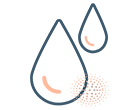Zhang, Y., Zuo, X., & Teng, Y. (2020). Women With Congenital Hypofibrinogenemia/Afibrinogenemia: From Birth to Death. Clinical and applied thrombosis/hemostasis : official journal of the International Academy of Clinical and Applied Thrombosis/Hemostasis, 26, 1076029620912819. https://doi.org/10.1177/1076029620912819
al-Mondhiry, H., & Ehmann, W. C. (1994). Congenital afibrinogenemia. American journal of hematology, 46(4), 343–347. https://doi.org/10.1002/ajh.2830460416
de Moerloose, P., Casini, A., & Neerman-Arbez, M. (2013). Congenital fibrinogen disorders: an update. Seminars in thrombosis and hemostasis, 39(6), 585–595. https://doi.org/10.1055/s-0033-1349222
Stanciakova, L., Kubisz, P., Dobrotova, M., & Stasko, J. (2016). Congenital afibrinogenemia: from etiopathogenesis to challenging clinical management. Expert review of hematology, 9(7), 639–648. https://doi.org/10.1080/17474086.2016.1200967
Neerman-Arbez, M., & Casini, A. (2018). Clinical Consequences and Molecular Bases of Low Fibrinogen Levels. International Journal Of Molecular Sciences, 19(1), 192. doi: 10.3390/ijms19010192
Asselta, R., Duga, S., & Tenchini, M. (2006). The Molecular Basis Of Quantitative Fibrinogen Disorders. Journal Of Thrombosis And Haemostasis, 4(10), 2115-2129. Doi: 10.1111/J.1538-7836.2006.02094.X





